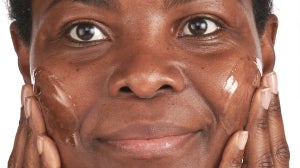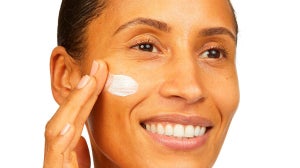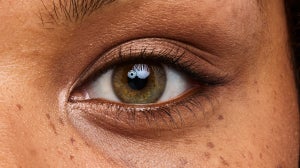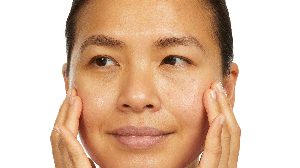
Psoriasis is a common skin condition that affects many people worldwide. Here we dive deeper into the symptoms, causes & effective self-care strategies that can help to alleviate its symptoms.
What is psoriasis?
Psoriasis is a long-term skin disorder, which can affect the skin, nails and joints. According to the Psoriasis Association, it is thought that around two to three per cent of the UK population is affected by the condition — approximately 1.8 million people.
It happens when your immune system becomes over-reactive which in turn speeds up the skin replacement process, taking just a few days to replace skin cells that usually take around 21 to 28 days.
This excessive production of skin cells leads to the formation of raised and often itchy patches on the skin. These patches normally appear on your elbows, knees, scalp and lower back, but can appear anywhere on your body including the face, eyelids and hands.
Psoriasis can come and go, causing temporary changes in skin colour and texture, at different levels of severity. Psoriasis is not contagious and can affect all skin types and genders equally.
Whilst psoriasis can occur at any age, it rarely affects young children, and research shows there seems to be two “peak times” that psoriasis may occur: from late teens to early thirties, and between the ages of around 50 to 60.
Psoriasis is thought to be related to a problem with the immune system and can be associated with a condition called psoriatic arthritis in about one in five people.
Although psoriasis is a long-term condition that can’t be cured permanently, there are many effective treatments and self-care practices that can help keep it under control.
What causes psoriasis?
The exact cause of psoriasis is still not fully understood, but it is believed to be a complex mix of genetic and environmental factors that can contribute to the development of the condition.
Research suggests that something triggers the immune system into overreaction, which in turn leads the skin cells being produced too quickly.
Some key factors that may contribute to this immune reaction and the development of psoriasis include:
Genetics: Psoriasis often runs in families, suggesting a genetic predisposition to the condition. If you have a family member with psoriasis, the risk of developing it is higher. However, more research into this is needed.
Environmental triggers: Certain environmental factors can exacerbate psoriasis symptoms. These triggers may include everyday stress, infections, cold weather or injuries to the skin.
Hormonal changes: Hormonal fluctuations triggered by puberty, pregnancy or the menopause can lead to the onset of psoriasis in some people. At the opposite end of the spectrum, these changes can also improve psoriasis for some people with the condition.
Lifestyle choices: Unhealthy lifestyle choices, such as smoking, excessive alcohol consumption and being overweight are all known to cause low-grade inflammation which can contribute to the severity of psoriasis symptoms and make it more challenging to manage the condition.
What are the symptoms of psoriasis?
Psoriasis is a complicated condition and can manifest in various forms and severity levels. The most common type of skin psoriasis is characterised by raised “plaques” on the skin which can also be flaky, scaly and itchy. The patches are usually red or pink on lighter skin tones and darker on darker skin tones, though it is worth noting that on black skin psoriasis may be harder to see.
Psoriasis patches normally appear on your elbows, knees, scalp and lower back, but can appear anywhere on your body. Facial psoriasis and psoriasis on the hands and fingers can occur also. Psoriasis is often itchy, irritating and painful, with people reporting stinging and burning sensations frequently.
In more severe cases, mobility and dexterity can be affected if areas such as joints and fingernails are involved. At this level, psoriasis treatment would need to be regularly monitored by your doctor.
Is there an emotional impact of psoriasis?
It’s no surprise that living with psoriasis can have a profound emotional impact. The visible nature of the condition can lead to feelings of embarrassment, self-consciousness and even depression.
The constant itchiness and discomfort can also disrupt sleep and daily activities. It is important to acknowledge the emotional toll that psoriasis can take and seek support from friends, family and health professionals when needed. Speak to your GP if you feel like psoriasis is affecting your mental health.
Can lifestyle & self-care changes help psoriasis?
While there is no cure for psoriasis, medical treatment is available and can help keep symptoms under control. In addition, several lifestyle and self-care strategies can help you manage the condition and ease discomfort. Here are some ideas that may be effective:
Maintain a healthy diet: A balanced diet rich in fruits, vegetables, whole grains and lean proteins can support overall health.
Manage everyday stress: Everyday stress is a known trigger for psoriasis flare-ups. Practicing relaxation techniques such as meditation, yoga or deep breathing exercises can help reduce stress levels.
Avoid smoking and excessive alcohol: Both smoking and excessive alcohol consumption can worsen psoriasis symptoms. Stopping smoking and moderating alcohol intake can have a positive impact on the condition.
Moisturise regularly: Keeping the skin well-hydrated can help reduce itching and discomfort. Opt for fragrance-free emollients - a moisturiser specifically formulated to treat dry skin conditions and apply them after bathing or showering and if under control, then routine daily use of a moisturiser to help keep skin hydrated.
Use sunscreen: Whilst sunlight can improve psoriasis symptoms for some individuals, it’s still crucial to use a broad-spectrum sunscreen with an SPF of at least 30 to protect the skin from harmful UV rays and prevent sunburn.
Is it necessary to seek medical advice?
It is essential to work with a medical professional if you suspect you have psoriasis or if you already have a diagnosis — your GP may refer you to a dermatologist for this. Alongside the self-care measures suggested above, it is really important that you take your prescribed medications as directed by your GP or dermatologist.










